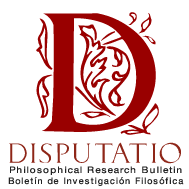Roger Scruton
University of Oxford, UK | rogerscruton@mac.com
Received: 31-May-2019 | Accepted: 10-September-2019 | Published Online: 31-September-2019
Disputatio [Sept. 2019], Vol. 8, No. 10, pp. 00-00 | DOI: 10.5281/zenodo.3575276
Article | [SP] | Full Text | Statistics | Copyright Notice [sp] | Vol. 8 No. 10
How to cite this article:
Scruton, Roger (2019). «Poesía y verdad». Disputatio. Philosophical Research Bulletin 8, no. 10: pp. 00–00.
Abstract | The poetic language responds to needs, rules and circumstances very different from those of ordinary everyday language or to technical languages, such as logic and science; however, notions of truth and falsehood can also be established in poetry. According to Heidegger, the poetic truth rests on the ability of poetry to reveal the presence that things have for themselves, regardless of any use that our daily practice can give them. This paper tests the previous assumption, and reflects on the type of truth that poetry can reveal, and which is, instead, beyond the reach of other types of languages.
Keywords | Heidegger · Art · Metaphor · Ontology · Poetic Language.
![]()
Poesía y verdad
Resumen | El lenguaje poético responde a necesidades, reglas y circunstancias muy diferentes a las del lenguaje ordinario y cotidiano o a las de los lenguajes técnicos, como el de la lógica y la ciencia; sin embargo, también en la poesía se pueden establecer nociones de verdad y falsedad. De acuerdo a Heidegger, la verdad poética se sostiene en la capacidad de la poesía para revelar la presencia que las cosas tienen por sí mismas, al margen de cualquier utilización que nuestra praxis cotidiana pueda darles. Este escrito pone a prueba la anterior suposición, y reflexiona sobre el tipo de verdad que puede revelar la poesía, y que está, en cambio, fuera del alcance de otros tipos de lenguajes.
Palabras Clave | Heidegger · Arte · Metáfora · Ontología · Lenguaje poético.
References
Brooks, Cleanth (1968). The Well Wrought Urn: Studies in the Structure of Poetry. Nueva York: Harcourt.
Cavalcanti, Guido (2009). The Selected Poetry of Guido Cavalcanti: A Critical English Edition, ed. Simon West. Leicester: Troubador.
Eliot, Thomas S. (1986). The Use of Poetry and the Use of Criticism: Studies in the Relation of Criticism to Poetry in England. Cambridge, MA: Harvard University Press.
Eliot, Thomas S. (1991) Collected Poems, 1909–1962. Franklin Center, PA: Harcourt Brace Jovanovich.
Elliott, Ray K. (1967). «Poetry and Truth», Analysis, 27/3: pp.77–85
Hardy, Thomas (1998). «When Dead». En Selected Poems, ed. Robert Mezey. Nueva York: Penguin Books, 1998, p. 170
Heidegger, Martin (2005). «El origen de la obra de arte», en Caminos de bosque, ed. y trad. de Helena Cortés y Arturo Leyte, Alianza Editorial, p.49 Versión original: «Der Ursprung des Kunstwerkes», 1935.
Koethe, John (2009) «Poetry and Truth», Midwest Studies in Philosophy, 33 (2009).
Lamarque, Peter (2009). «Poetry and Abstract Thought», Midwest Studies in Philosophy, 33: pp.37–52.
Rilke, Rainer Maria (2009). «Novena Elegía», The Poetry of Rilke, Edición bilingüe, tr. Edward Snow, 1era edn. Nueva York: North Point Press.
Verlaine, Paul y kirchwey, Karl (2011). Poems Under Saturn: Poèmes Saturniens, tr. Karl Kirchwey. Princeton: Princeton University Press.
Wagner, Richard (1887-8). «Die Religion und die Kunst», en Gesammelte Schriften und Dichtungen, 2da edición, 10 vols. Leipzig, 1887–8.
Veats, William B. (2003). The Tower: A Facsimile Edition. New York: Scribner.
© The author(s) 2019. This work, published by Disputatio [www.disputatio.eu], is an Open Access article distributed under the terms of the Creative Commons License [BY–NC–ND]. The copy, distribution and public communication of this work will be according to the copyright notice. For inquiries and permissions, please email: boletin@disputatio.eu.

